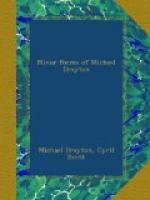And quickly Armes him for
the Field,
A little Cockle-shell his
Shield, 490
Which he could very brauely
wield:
Yet could it not
be pierced:
His Speare a Bent both stiffe
and strong,
And well-neere of two Inches
long;
The Pyle was of a Horse-flyes
tongue,
Whose sharpnesse
nought reuersed.
And puts him on a coate of
Male,
Which was of a Fishes scale,
That when his Foe should him
assaile,
No poynt should
be preuayling:
500
His Rapier was a Hornets sting,
It was a very dangerous thing:
For if he chanc’d to
hurt the King,
It would be long
in healing.
His Helmet was a Bettles head,
Most horrible and full of
dread,
That able was to strike one
dead,
Yet did it well
become him:
And for a plume, a horses
hayre,
Which being tossed with the
ayre, 510
Had force to strike his Foe
with feare,
And turne his
weapon from him.
Himselfe he on an Earewig
set,
Yet scarce he on his back
could get,
So oft and high he did coruet,
Ere he himselfe
could settle:
He made him turne, and stop,
and bound,
To gallop, and to trot the
Round,
He scarce could stand on any
ground,
He was so full
of mettle. 520
When soone he met with Tomalin,
One that a valiant Knight
had bin,
And to King Oberon
of kin;
Quoth he thou
manly Fayrie:
Tell Oberon I come
prepar’d,
Then bid him stand vpon his
Guard;
This hand his basenesse shall
reward,
Let him be ne’r
so wary.
Say to him thus, that I defie,
His slanders, and his infamie,
530
And as a mortall enemie,
Doe publickly
proclaime him:
Withall, that if I had mine
owne,
He should not weare the Fayrie
Crowne,
But with a vengeance should
come downe:
Nor we a King
should name him.
This Tomalin could
not abide,
To heare his Soueraigne vilefide:
But to the Fayrie Court
him hide;
Full furiously
he posted, 540
With eu’ry thing Pigwiggen
sayd:
How title to the Crowne he
layd,
And in what Armes he was aray’d,
As how himselfe
he boasted.
Twixt head and foot, from
point to point,
He told th’arming of
each ioint,
In every piece, how neate,
and quaint,
For Tomalin
could doe it:
How fayre he sat, how sure
he rid,
As of the courser he bestrid,
550
How Mannag’d, and how
well he did;
The King which
listened to it,




